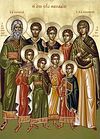

| Previous day | Next day |
| Old Style
August 1
|
Monday |
New Style
August 14
|
|
11th Week after Pentecost.
Tone 1.
Начало Успенского поста. |
Monastic rule: xerophagy (bread, uncooked fruits and vegetables).
|
![]() Procession of the Precious Wood of the Life-giving Cross of the Lord.
Procession of the Precious Wood of the Life-giving Cross of the Lord. ![]() Holy Seven Maccabees: Martyrs Abimus, Antonius, Gurias, Eleazar, Eusebonus, Alimus, and Marcellus, their mother Solomonia, and their teacher Eleazar (166 b.c.).
Holy Seven Maccabees: Martyrs Abimus, Antonius, Gurias, Eleazar, Eusebonus, Alimus, and Marcellus, their mother Solomonia, and their teacher Eleazar (166 b.c.).
Nine Martyrs of Perge in Pamphylia: Leontius, Attius, Alexander, Cindeus, Minsitheus (Mnesitheus), Cyriacus, Mineon (Menaeus), Catanus, and Eucleus (3rd c.). Commemoration of the Baptism of Rus’ (988). St. Nicholas, Equal-to-the-Apostles, enlightener of Japan (1912).
New Hiero-confessor Alexander (Urodov), archimandrite, of Sanaxar and Seven Lakes Monasteries (1961).
St. Eusebius, bishop of Verceil (Italy) (ca. 371). Martyr Elessa of Cythera (375). Sts. Friardus of Vindumitta (573) and Secundellus, deacon (6th c.), of Gaul. St. Timothy the Wonderworker, bishop of Proconnesus (6th c.). St. Cennydd (Kenneth), monk, of Llangenydd (Wales) (6th. c.). St. Ethelwold, bishop of Winchester (984). Finding of the relics of Bishop Nestor (Zass) of the Aleutians and Alaska (1882).
Repose of Abbess Alexia of Nizhni-Novgorod (1940).
Thoughts for Each Day of the Year
According to the Daily Church Readings from the Word of God
By St. Theophan the Recluse

Monday. [II Cor. 2:4-15; Matt. 23:13-22]
Woe unto you…for ye shut up the Kingdom of Heaven against men. This is said to the chief priests, who neither teach the people themselves the saving path, nor compel the priests to do it; this is said also to priests who leave the people in neglect, not taking care to explain to them what is necessary for the salvation of the soul. From this the people remain in blindness, and one part remains in the certainty that it is going properly; the other, though it notices that things are not going the right way, does not go where it should, because it does not know how and where to go. This causes various silly ideas to spread among the people; this is why schismatics, molokans and khlysts[1] find acceptance among them, and this is how every evil teaching finds convenient access to them. A priest usually thinks that in his parish everything is fine, and rushes into action only when this evil has already spread and come to light. But then it is too late do anything about it. A priest must consider it the first priority of his conscience to continually instruct the adults in the knowledge of the Christian faith, and to prepare the young generation from their first conscious years, explaining to them what they can and must know. There is no need to wait for school. This must be done orally, gathering the children in the church and at home on Sunday evenings, or whenever and however it is convenient.
[1] Schismatics refer to the Old Believers, and Molokans and Klysts were Russian sects.







